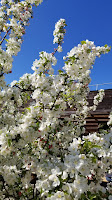I'm a humanitarian aid worker. I have a hard time whenever someone starts telling how great a job I'm doing. My normal responses run the gamut from a humble "thank you" to the usual, "I don't do it for the recognition" to the adamant "I'm not a super hero!"
Well-meaning bystanders applaud me all the time, and I am uncomfortable with it. I have finally fine-tuned my response to a semi-stranger when they eventually ask "so what do you do?"
"I'm do project management for an international medical organization."
"Oh, uh, cool. That sounds... international"
The conversation moves on.
Much better than:
"I work for Doctors Without Borders."
"OMG, tell me everything about you. You are now the coolest person I've ever met. How many people have you seen die?"*
*Disclaimer: This generic reaction is slightly exaggerated and has never actually happened to me in these exact words, but you'd be surprised how close people get. UPDATE: I have been asked how many people have I seen die. The other party hedged and clarified the question was to ask if it was a non-zero number.
I reflect often on why people's admiring or favorable reactions make me so uncomfortable. I can't quite pin it down. But it's true that I don't do my job so that others can be grateful of my work or sacrifice or efforts.
I do what I do because I can't imagine working for my own personal gain.
I have access to the internet, I have a first-rate education, I grew up with roads, running potable water, sewers, traffic lights, police, a fire department. We even had a dog as a pet. My childhood was spent climbing trees and getting dirty.
I have so much more than the vast majority of this world's population, I cannot imagine working to amass personal wealth. Why wouldn't I work to help the less fortunate?
Also, it is the most challenging occupation I could think of doing, and I want to pit myself against the most difficult situations, for the most possible net gain in the wellbeing of the world. It's logical.
Well-meaning bystanders applaud me all the time, and I am uncomfortable with it. I have finally fine-tuned my response to a semi-stranger when they eventually ask "so what do you do?"
"I'm do project management for an international medical organization."
"Oh, uh, cool. That sounds... international"
The conversation moves on.
Much better than:
"I work for Doctors Without Borders."
"OMG, tell me everything about you. You are now the coolest person I've ever met. How many people have you seen die?"*
*Disclaimer: This generic reaction is slightly exaggerated and has never actually happened to me in these exact words, but you'd be surprised how close people get. UPDATE: I have been asked how many people have I seen die. The other party hedged and clarified the question was to ask if it was a non-zero number.
I reflect often on why people's admiring or favorable reactions make me so uncomfortable. I can't quite pin it down. But it's true that I don't do my job so that others can be grateful of my work or sacrifice or efforts.
I do what I do because I can't imagine working for my own personal gain.
I have access to the internet, I have a first-rate education, I grew up with roads, running potable water, sewers, traffic lights, police, a fire department. We even had a dog as a pet. My childhood was spent climbing trees and getting dirty.
I have so much more than the vast majority of this world's population, I cannot imagine working to amass personal wealth. Why wouldn't I work to help the less fortunate?
Also, it is the most challenging occupation I could think of doing, and I want to pit myself against the most difficult situations, for the most possible net gain in the wellbeing of the world. It's logical.







